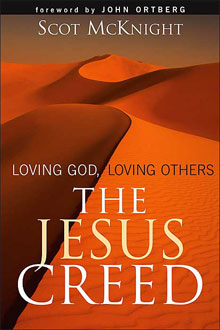Book Notes
 Scot McKnight, The Jesus Creed; Loving God, Loving Others (Brewster, MA: Paraclete Press, third printing, 2005), 335pp.
Scot McKnight, The Jesus Creed; Loving God, Loving Others (Brewster, MA: Paraclete Press, third printing, 2005), 335pp.
First published in September 2004, The Jesus Creed is already in its third printing, and the recipient of Christianity Today's Book Award for 2005 as one of the best books of the year to introduce people to evangelical Christianity. Clearly, McKnight, the Karl A. Olsson Professor in Religious Studies at North Park College (Chicago), has struck a chord with a considerable reading audience.
The strength of his book is its focus on what is central to the faith rather than peripheral, and to present that central affirmation in a simple, which is not to say simplistic, manner. McKnight taught seminary students for eleven years before choosing to teach college-level students for the past ten years, and about half of these younger students are not Christian. I admired his ability to move from his capacity as a technical specialist who has written more weighty tomes to connect with people who know nothing at all about the faith. A number of other strengths commend this book. McKnight draws upon a wide fund of ecumenical sources—Eastern Orthodox, Roman Catholic, mainline Protestant, Pentecostal, and evangelical. He uses story-telling to good effect by sharing real-life anecdotes from his personal, family, and professional life. His style is casual throughout, and for that reason entirely accessible. John the Baptist, for example, "was wired hot and a bit off his rocker, living in the wilderness, eating bugs, and calling the nation to repentance" (141). Being the scholar that he is, McKnight also roots his discussion in the Jewish context of the life and times of Jesus. Although his presentation is simple, at the same time it is comprehensive, guiding the reader through such issues as community, social justice, the sacraments, and so forth. Finally, I appreciated McKnight's book because he introduces his readers to sources from the ancient to the modern, and to points in between. You will learn about the early fathers, the medieval monastics, the Reformation Protestants, and modern-day writers from Dorothy Sayers to CS Lewis and Dallas Willard.
And just what is the Jesus Creed? It is Jesus's amended version of the Jewish Shema of Deuteronomy 6:4–9, the heart and soul, the sine qua non or quintessence of Judaism. When asked by an expert in the Law about the greatest commandment, Jesus answered with the Shema, adding to it Leviticus 19:18: "Hear, O Israel, the Lord our God, the Lord is one. Love the Lord your God with all your heart, with all your soul, with all your mind, and with all your strength. The second is this: Love your neighbor as yourself. There is no commandment greater than these" (Mark 12:28–33). In this short summary we have what Thomas à Kempis called "a whole dictionary in just one dictum" (8). In the rest of his book McKnight parses the grammar of Christian faith so clearly that few readers could misunderstand.


